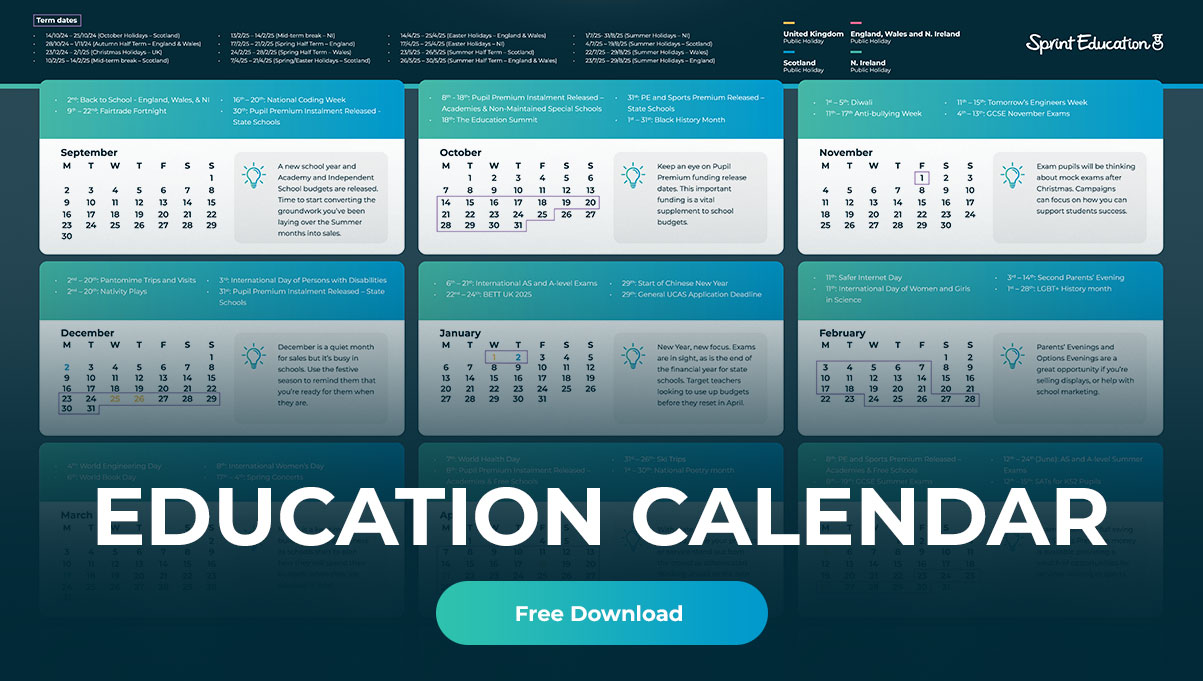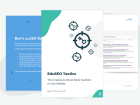Boost Website Visitors: EduSEO Tactics
Boost Website Visitors: EduSEO Tactics
Discover the 6 search engine optimisation tactics to attract more teachers to your website.
Discover the 6 search engine optimisation tactics to attract more teachers to your website.
An SEO Guide for Education Businesses
Crack your education-focused SEO strategy in 6 effective tactics!
When starting Sprint Education back in 2007 I knew plenty about marketing, but diddly-squat about SEO (Search Engine Optimisation). Yet I did understand that if I wanted Sprint Education to grow quickly, I had to get www.sprint-education.co.uk to the top of search engine rankings; I had to make sure Sprint Education’s website was clearly visible so that any education businesses searching the likes of Google’s listings for education marketing services could find us.
Thinking this would be an enjoyable challenge I decided to train myself up and manage the company’s SEO in-house. After all, Jackie (my wife who also sits to my left here at Sprint) is a Google AdWords Certified Expert, so I thought that learning SEO would give Sprint Education the full set of skills in-house to expertly conquer our internal search marketing challenges.
However, as is always the case the daily grind of running a company came between me and my goal, and before I’d even Googled the letters “SEO”, I had taken the easy way out by outsourcing the task to a well-respected SEO agency that promised me “top of ranking results”.
The Problem!
The problem was that when the experts realised just how competitive Sprint Education’s search terms were, such as “education”, “schools” and “marketing”, they decided to own up (half way through the contract) and admit that actually they couldn’t get the website to the top of the rankings, our search terms were just too competitive.
The SEO experts had clearly underestimated the education sector and had failed to recognise early on how different the UK education sector is compared to the standard B2B sector, and how all forms of marketing, including SEO, need to be managed differently.
Although at the time I knew little about SEO, the one thing I did understand inside out was the education sector and how schools, teachers, and education businesses think/act/behave. I saw this as a blessing in disguise; the SEO experts failure was the fire I needed to re-ignite my determination to make www.sprint-education.co.uk the trailblazer of all edu-marketing websites. After all, I’d designed the site, written the content, and even “acted” in some of the videos, so I couldn’t fail it now. Not only was it something I was very fond of, it was also the single most powerful marketing tool at Sprint Education’s disposal, and I couldn’t afford to overlook it any longer. After all, my sluggishness to implement a proper SEO strategy was starting to cost the company in missed site visits and ultimately new clients.
So I completed a few SEO training courses during the evenings and became an SEO “expert” within a few days! It was easy!
Okay, that last bit was complete nonsense!
Yes I did some training courses. I learnt a lot actually, but it took months not days to learn. I had to go much deeper than just completing an online course, I had to get stuck into testing and tweaking our website, learn from my mistakes, review the code, analyse other sites, and optimise content and site speed. But eventually the website ranking started to climb higher and higher.
I had originally underestimated what was required to become proficient at SEO. However, I’d finally implemented a strategy that got www.sprint-education.co.uk to #1 in the rankings for many of our key search terms.
This SEO strategy has enabled me to generate hundreds of extra visitors to Sprint Education’s website every week equating to a 38% rise in website traffic which has contributed to a 24% rise in sales over the past year alone.
Knowing what I now know about SEO combined with my understanding of how to market and sell to schools and teachers, I think it’s vital that I share what I’ve learnt with Sprint Education’s audience of education businesses. Our job is to help you sell more to schools, whether you use our services or not. So I’ve laid out the 6 hard and fast SEO tactics that I’ve learnt in the hope that it saves you the time and rigmarole of trying to deep dive into the SEO quagmire.
Each of the following 6 tactics have worked wonders for Sprint Education’s website ranking, but some of the language to describe them may be unfamiliar, so I would recommend that any newbies to SEO should have a quick read of Moz’s (SEO software experts) beginner’s guide to SEO: https://moz.com/beginners-guide-to-seo.
If you still feel you need some SEO support after reading the following tactics then get in touch with us by email at info@sprint-education.co.uk. Sprint Education now offer a world-first eduSEO focused service dedicated only to education businesses. This service is focused purely on driving a lot more teachers to your website!
Tactic #1: A Page Title is a Work of Art!
Your page title is typically the single most important on-page factor for SEO so your education website’s Title Tags should be carefully crafted; forming concise taglines that search engines can easily understand (so they are able to rank your website higher), whilst still engaging with teachers when they read your title in Google’s listings.
Ben’s eduSEO Recommendations:
If you want teachers to find your website easily then you must make sure your Title Tags tick many boxes. If you nail these then your website ranking should improve!
I would suggest considering the following tactics...
- Restrict the number of characters in your Title Tag to no more than 70.
- Use education sector relevant language/phrases that engage with teachers.
- Choose keywords that are relevant to your site’s content.
- Put yourself in the shoes of a teacher, which keywords would they search for?
- Can your Title Tag strike a chord with teachers’ pain-points in their roles?
- Weight the keywords towards the beginning of your Title Tag.
- If your brand name carries recognition amongst teachers, include it!
If you get this spot on your online visability will soar and teachers will flock to your website in droves.
Tactic #2: Stuff Keywords in Your Title at Your Peril!
Keyword stuffing in a page title is classed as over-optimization. It should be avoided! Stuffing a title with keywords could result in a search engine penalising your website in its rankings. The following is an example of a keyword stuffed page title: “Maths Teacher Training Courses, Courses for Maths Teachers, Maths Teacher Training | Maths Courses R US”.
Instead, a better version of this Title Tag could be written as: “2017 Maths Curriculum Teacher Courses | Maths Courses R US”.
Jackie’s eduSEO Recommendations:
When you’re desperate to reel in more teachers to your website, you may fall into the trap of turning your Title Tags into a long list of keywords. DON’T! Try this tactic instead...
- Set up an online survey.
- Create a list of questions to identify how teachers search online.
- Questions should lead to qualitative not quantitative answers.
- Design an email asking teachers to complete your survey.
- Offer an incentive to increase survey completions.
- Send the email to your target audience of teachers.
- Finally select the keywords that align with your webpage and how teachers search.
REMEMBER! If you don’t have the means in-house to complete the above, then Sprint Education can complete a stand-alone SEO research project as part of a complete eduSEO strategy for you.
Tactic #3: Crack the Keyword Content Code
Using target keywords within the content of your website will help search engines to rank specific pages of your website higher for the relevant search terms. For example, if you specialise in selling Science Equipment, specifically Bunsen burners and test tubes, you will want the test tube page to show when Science Teachers search for test tubes, and the Bunsen burners page to rank highly when teachers are searching for them.
So you would refine your keyword focus depending on the specific webpage you are optimising.
Including keywords with a few variations or synonyms within a single webpage is a good idea. If your webpage has less than 500 words it’s recommended to input 3 or 4 keywords. For over 500 words, 5 or 6 keywords should suffice.
Just like your Title Tags, you should definitely avoid unnatural stuffing of keywords. It makes your website worse for users to interact with, whilst search engines will penalise your webpage ranking. Utilise the research you’ve already carried out (refer to Tactic #2) and use this to guide your keyword content plan.
Tactic #4: A Striking Meta Description = More Clicks
Your education website’s Meta Description plays almost no role in how your site is ranked by search engines, but it is the most important factor to consider when trying to encourage teachers to click through to your website to read more. As with page titles, Meta Descriptions will be concatenated if they are too long, so aim to keep them below 155 characters.
Selina’s eduSEO Recommendations:
Many SEO strategies will ignore the Meta Description due to it not having a direct involvement in your ranking. However, when crafted with thought and care, it will entice more visitors to your website.
- Use action words like “discover” or “learn”.
- Ensure that description aligns with the webpage content so teachers don’t feel duped.
- Highlight how your website could solve one/many pain-points that teachers experience.
- Don’t use more than 155 characters.
- Use terminology that is education sector relevant, e.g. “Exams” or “Curriculum”.
DID YOU KNOW? As part of Sprint Education’s eduSEO service we will draw upon our unrivalled education sector knowledge and create a set of dynamic and engaging Meta Descriptions for your website.
Tactic #5: Beware of Over Optimisation
Taking the keyword-stuffing issue to a whole new level sees many SEO “experts” destroy a website’s user experience by aggressively exaggerating the SEO across the website. This over-optimisation can result in a significant drop in rankings.
Search engines will have ‘checklists’ of things that make a page look too ‘SEO’d’; an over-optimisation penalty is then applied when the number of items found on a page passes a certain threshold. Examples of things that count towards over-optimization are:
- Listing too many keywords in the page title (separated by comas, pipes, or dashes).
- Over using keywords.
- Content that is stuffed with keyword phrases.
- Long URLs with extensive keyword use.
DON’T PANIC! If you do have an over optimised website you can correct these issues. Search engines will then re-crawl your webpages, and remove the over optimisation penalty from your website.
Tactic #6: URL Perfection
The URL of a page is considered to be a ranking factor used by search engines, so you should aim to include target keywords where possible, separated by hyphens. Like the following example: www.sprint-education.co.uk/services/uk-education-database
Remember that if you are changing an existing URL, you should use a 301 redirect to transfer the authority and rankings associated with the old URL to the new one.
A secondary benefit to using descriptive keywords in your URLs is that it is likely to help encourage more clicks from users.
Stu’s eduSEO Recommendations:
If it’s possible to restructure your website’s URLs it might be worth considering. A solid URL structure will make a difference to your ranking!
- If possible, use education relevant words in the URL that teachers will recognise.
- 50-60 characters is a good length for your URL.
- Hyphens and underscores are preferred word separators.
- Keywords are good, but keyword stuffing is pointless!
- Make it clear from the URL what will be found on the page, avoid gobbledygook.
DID YOU KNOW? With Sprint Education’s eduSEO service, we will create a proposal based on how we believe your site URLs should be fashioned and how this will help engage with teachers better, whilst enhancing your website’s ranking.
Introducing eduSEO: The world’s first education focused SEO service
Having introduced the first ever direct to teacher email strategies (2008), and the first integrated education data and marketing software solution Campus (2015), Sprint Education have now launched the world’s first eduSEO service. This managed SEO strategy is dedicated only to education businesses looking to get their website ranked higher in search engines, and gain more teachers as site visitors. Get in touch with one of our eduSEO experts at info@sprint-education.co.uk or call 01684 297374.
Tags
Website
Similar Articles

Email Landing Pages Part 2: Scent
If you're planning to email schools in the Autumn Term then I'm sure you will see an avalanche of interested teachers cl...

2013 - What does the future hold? (10 Big Changes)
In 2012 the world of schools’ marketing progressed to new levels with direct emails to teachers hitting new heights of R...


Expert marketing to schools support and solutions
Expert marketing to schools solutions
Email Head Teachers, Teachers, and Staff Inboxes
Email teachers and staff inboxes
Sell More to UK and Global Schools and Colleges
Sell more to schools and colleges

































